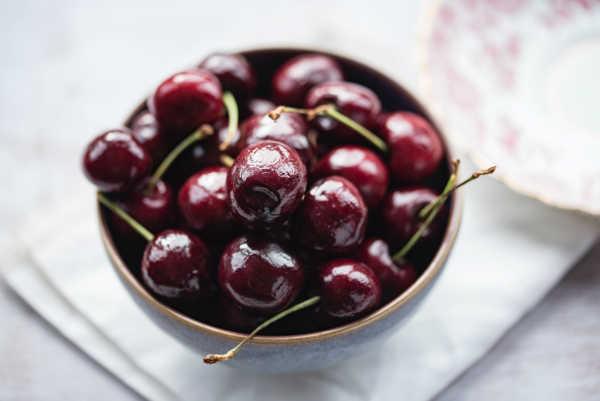
Have you been having more trouble falling asleep at night or sleeping through the night lately? Then you should definitely try these 8 foods! They all contain something that helps you fall asleep faster and sleep better. Sounds good, right? Read on quickly and find out what you can eat for a better night's sleep!
Read also :'Zzzen:try this to get a better night's sleep'
Sour cherries are high in melatonin, a hormone that helps regulate your sleep rhythm. In a small study, participants found that they slept longer and deeper after drinking a concentrated juice of these cherries. Research also showed that incorporating tart cherries into your diet can help you sleep both better and longer when you suffer from insomnia… That bodes well, doesn't it? Fresh tart cherries are harder to find than sweet cherries, but you can also find them frozen, dried or in juice.
28 grams of almonds contain almost 25% of the amount of magnesium that women need on a daily basis. And let this be a mineral that does not appear much in our diets… In fact, almost 80% of the population - according to research - does not get enough magnesium. That while a low magnesium level can contribute to insomnia… Your brain has to calm down when you fall asleep and magnesium can help with that. As a result, almonds can help you get to sleep. Eat them as a snack, put them in your yogurt or eat them in your salads; tasty, healthy and good for your night's sleep!
In a study examining sleep differences between diets – with differences between carbohydrate, fat and protein intakes – participants experienced less sleep deprivation when they followed a diet with a higher carbohydrate intake. Oatmeal flakes are a good source of carbohydrates and they also contain magnesium. Start your day well with a bowl of overnight oats for breakfast. Even add some almonds for even better results!
Many people are deficient in fiber, which in turn can affect your sleep pattern. One study even found that a diet low in fiber results in less deep sleep and that a diet high in fiber actually results in longer periods of deep sleep. Most adults need between 25 and 35 grams of fiber per day:140 grams of raspberries already contain 9! For example, make a delicious smoothie (bowl) of these red rascals and add some other fiber sources, such as chia seeds and kiwi. Sleep well!
Do you already pay a lot of attention to your gut health? New? Maybe it's time for that! Your gut health is inextricably linked to your sleep pattern. It affects your mood, your stress levels and your sleep rhythms. One of the best ways to keep your gut healthy is by eating probiotic foods, such as yogurt. Top your bowl of yogurt in the morning or after dinner with some fruit and nuts to make it not only tastier, but also more effective!
Another factor that can make it difficult to fall asleep and stay asleep is having high stress levels. Not only can regular exercise and breathing exercises help you to stress less, but foods high in vitamin C and omega-3 fatty acids can also help decrease your stress hormones. Citrus fruits, such as oranges, grapefruit, tangerines, lemons and limes, are high in vitamin C, as are strawberries and legumes. Smoothie or juice, any one?
We were just talking about the effect of omega-3 fatty acids on your stress levels - and therefore also your sleep pattern - so it should come as no surprise that it is on this list. Salmon is high in omega-3 fatty acids, which are considered "essential" since your body cannot produce them on its own. A 100 gram salmon contains 2.6 grams of omega-3 fatty acids. Sprinkle a little lemon on top for some extra vitamin C! Not a fan of salmon? Mackerel also contains a lot of these healthy fats and can help you sleep better.
Eating magnesium-rich foods can help you improve your sleep, especially if you suffer from insomnia or wake up regularly during the night and then cannot go back to sleep. Research shows that a magnesium deficiency can make it more difficult to fall asleep again. To get enough magnesium, it is wise to add a lot of green vegetables to your diet, as well as legumes, nuts and seeds. Green vegetables, such as arugula, spinach or kale, also contain vitamin C, which can help bring your stress levels down. So win-win!
Source: Realsimple.com